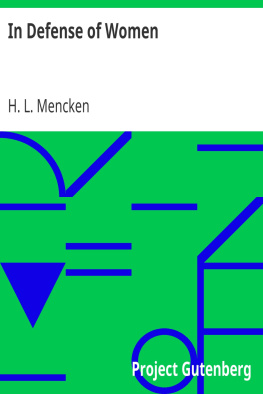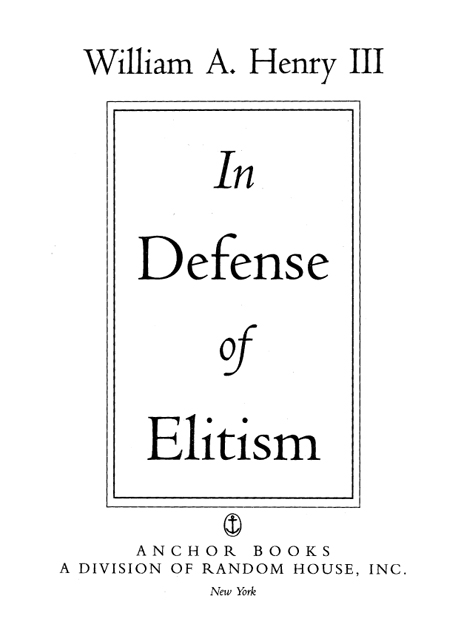Also by William A. Henry III
The Great One
Visions of America: How We Saw the 1984 Election
FIRST ANCHOR BOOKS EDITION, AUGUST 1995
Copyright 1994 by William A. Henry III
All rights reserved under International and Pan-American Copyright Conventions. Published in the United States by Anchor Books, a division of Random House, Inc., New York, and simultaneously in Canada by Random House of Canada Limited, Toronto. Originally published in hardcover in the United States by Doubleday in 1994. The Anchor Books edition is published by arrangement with Doubleday, a division of Random House, Inc.
Anchor Books and colophon are registered trademarks of Random House, Inc.
The Library of Congress has cataloged the Doubleday edition as follows:
Henry, William A., 1950
In defense of elitism / William A. Henry III.1st ed.
p. cm.
1. Elite (Social sciences)United States.
2. EqualityUnited States. I. Title.
HN90.E4H45 1994
305.520973dc20 94-11893
ISBN 0-385-47943-3
eBook ISBN: 978-1-101-91241-6
www.anchorbooks.com
v3.1
For the friends who egged me on, especially the handful willing to have me say so in public:
Jim Burrus
Kay Gardella
Tom Geyer
George Gowen
Diana Green
Kjell Hornslien
Acknowledgments
I N A SENSE this book, or for that matter any book, is the product of all the authors life experiences, which are too numerous and tedious to set down here, and of all the authors reading, the most salient of which is quoted in the text. So my thanks are more practically restricted to the people who contributed to the development of the ideas and rhetoric, either by their forbearance in listening or by the vigor of their rebuttal. Without distinguishing among them by degree of enthusiasm or horror for the ideas propounded, Id like to thank Kent Allen, Margaret Barthelme, Eliot Berry, Alan Brinkley, Andrew Carron, Charlotte Chandler, Camille Chwalek, Kevin Conroy, Eric Copage, Lucille and Tony Davino, Nancy Dickerson, John Dorfman, Gwynneth Dunwoody, MP, Dan Dwyer, Steve Economides, Robert Elliott, Omar Figueroa, Reuven Frank, Craig Gilbert, Ramon Gonzalez, Jeff Guss, Phil Heathcote, Mimi Hirsh, Con Howe, Leon Jaroff, Marilyn Kengla, Paul LaCosta, Jr., Peter Lane, Al Lauber, Mark Mobley, Evangeline Morphos, Martin Mugar and the Art Institute of Boston, Pat, Tony, Paul and Neil Munn, Jon Nygaard, Billy OLeary, Thomas Cruise Palmer, Tom Plate, Adam Redfield, John Robinson, Tom Sabulis, Sylvia Sandeen, Christine, Guido and Joseph Sandulli, Stephen Shanley, Janice Simpson, Doug Sivco, Margaret Garrard Warner, and Anne Cabot Wyman.
Professionally, this book and its author are indebted to my agent, Michael Carlisle of the William Morris Agency, and my editor, David Gernert, for their unquenchable enthusiasm and unfathomable patience. Personally, this volume owes whatever creative tension it has between traditionalist theory and liberal pragmatism to my late mother, Catherine Henry, who lovingly fought me tooth and nail on every idea herein. As always, the central support in my life is my wife, Gail, whose editing was irreplaceable and whose snorting skepticism surely saved me from even worse pomposity and bombast than survives in the succeeding pages.
My close friend and research assistant James Burrus helped collate and synopsize the boxes full of background materials I had accumulated. His robust humor and fine sense of the ridiculous are evident on every page that is even faintly amusing.
Contents
ONE
The Vital Lie
TWO
Good Old Golden Rule Days
THREE
Affirmative Confusion
FOUR
Why Cant a Man Be More Like a Woman?
FIVE
Nature and Nurture
SIX
The Museum of Clear Ideas
SEVEN
Noahs Ark, Feminist Red Riding Hood, Karaoke Peasants, and the Joy of Cooking
EIGHT
Politics by Saxophone
ONE
The Vital Lie
Cooperation is in, competition is out.
The New York Times, May 16, 1993
S OMEWHERE along Bill Clintons path to the White House it dawned on me that the term elitist, which I had matter-of-factly applied to myself and most of my fellow liberal Democratic friends for decades, has come to rival if not outstrip racist as the foremost catchall pejorative of our times. Once I began consciously looking, I found evidence everywherefrom tabloid newspapers to scholarly journals, from smirky game shows to sober academic discourse, above all in the public rhetoric of liberals and conservatives alikethat belief in any sort of elitism, and in the all-important hierarchy of values that must underlie such a belief, has been pushed outside the pale of polite discussion. The very word, used as a label, seems to be considered enough for todays rhetoricians to dismiss their opponents as defeated beyond redemption.
At first I was inclined to write off most of the invective as the familiar if unedifying business of the have-less many ganging up on the better-off few. Envy may be one of the seven deadly sins in theological circles, but it is a box office winner in every sort of ordinary conversation. Gradually and reluctantly, however, I realized that the wrath directed at elitism has less to do with money than with populist, egalitarian scorn for the very kinds of intellectual distinction-making I hold most dear: respect and even deference toward leadership and position; esteem for accomplishment, especially when achieved through long labor and rigorous education; reverence for heritage, particularly in history, philosophy, and culture; commitment to rationalism and scientific investigation; upholding of objective standards; most important, the willingness to assert unyieldingly that one idea, contribution or attainment is better than another. The worst aspect of what gets called political correctness these days is the erosion of the intellectual confidence needed to sort out, and rank, competing values. It used to be that intellectual debate centered on the results of such assessment. We have retrenched to the point that the very act of starting the process requires audacityor, as opponents phrase it, insensitivity.
Not long before she died, anthropologist Margaret Mead speculated that the United States was entering a new Dark Ages of medieval mysticism and mumbo-jumbo, of belief based on self-interest, mob politics, and fear rather than research and open-minded inquiry. She was far more correct than even she dreaded. The great post-World War II American dialectic has been between elitism and egalitarianism. Both are deeply American, precisely because they are deeply European. They were arguably the chief competing tenets of the eighteenth-century Enlightenment that was in turn the wellspring of American identity. The tension between them has swung way out of balance, and the wrong side, the unthinking and nonjudgmental egalitarian side, has been winning. A brand of anti-intellectual populism is running amok, eerily reminiscent of the nineteenth-century Know-Nothing movement, albeit a mirror image of it in political terms. Where that movement centered on ugly nativism and exclusion, this one carries inclusion to its comparable extreme, celebrating every arriviste notion, irate minority group, self-assertive culture, and cockamamie opinion as having equal cerebral weight, and probably superior moral heft, to the reviled wisdom and attainments of tradition. This multicultural revisionism is sometimes refreshing and instructive, but more often merely silly and occasionally deeply harmful. Often accompanying it is the still more dangerous assumption that the only fair measure of any sifting mechanism is the demographic equality of results it produces, not the relationship between the results and attainments in the real world.









